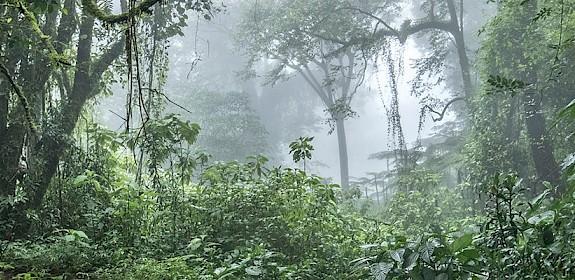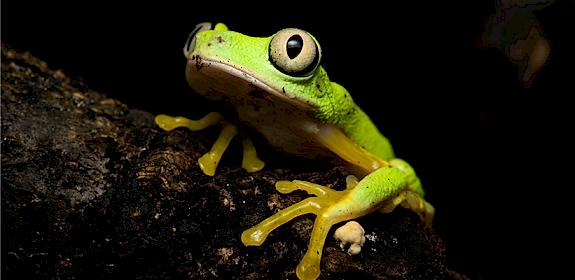
RDC La répression des crimes fauniques
Aerial view of Salonga National Park, Democratic Republic of Congo © Thomas Nicolon / WWF DRC
i
- »
- Publications »
- Reports »
- La répression des crimes fauniques en RDC
Published 1 January 2019
comment améliorer les poursuites judiciaires?
The Democratic Republic of Congo (DRC) is a country in the Congo Basin whose biological diversity is one of the richest in the world because of the countless and varied wildlife and flora that compose it.
La répression des crimes fauniques en RDC
Report author(s):
Ngeh Chiambeng Paulinus, Shabani Aziza Nancy, Mabita Mafuta Christian et Djamba Kasongo Emile
Publication date:
January 2019
key findings
To protect its rich biodiversity, government has a rich and varied legal framework that integrates different aspects and provisions of wildlife protection as well as institutions (ICCN, DCN, JUSTICE, DGDA, OCC, PNC) that not only prevent wildlife crimebut also suppress it. In addition, it has signed several international conventions aimed at protecting and regulating wildlife trade and conservation, including CITES (Washington, 3 March 1973).
With such legal and institutional mechanisms in place, it would be expected that any offense would be brought to the knowledge of the competent authorities, such as judiciary, for processing and decision. Unfortunately, in spite of the high rate of wildlife crime in the country, many cases are not brought before the courts. The few cases brought before the courts and tribunals are not always sanctioned by a judgment of conviction. Indeed, out of the 35 cases registered6 between January 2016 and March 2018 in the judicial circuit, only 3 judgments were rendered.
During the period of this study, which took place between May 28 and June 30, 2018 we were able to establish that 6 out of 10 files brought to the attention of the Public Prosecutor's Office were weak (poorly drafted, non-established offenses, lack of evidence, procedural delays largely exceeded etc.). With such records, the prosecution usually has no choice but to dismiss the cases. In addition, "many other problems gravitate to an effective and effective application of the law on wildlife", these include ignorance of certain laws, weak capabilities especially in investigations, weak collaboration between services and institutions working in the chain of law enforcement, influence peddling and corruption.
As a result of this study, and with a view to improving the prosecution of wildlife offenses, we make the following recommendations:
- improve investigations so that they lead to the establishment of evidence to help forge the judge's conviction to apply the law;
- strengthen the capacities of the main actors in the fight against wildlife crime. This should consist of training sessions on specific modules related to the law and its enforcement (procedure, environmental law, offenses, etc.), promoting between these structures with their foreign counterparts, as well as increasing resources (working materials, finances, etc.);
- improve collaboration and exchange of information between the main actors (JUSTICE, ICCN, DCN, DGDA, OCC) notably by encouraging the main actors to use AFRICA-TWIX electronic information exchange platform. This collaboration and exchange of information will facilitate field operations and enrich the files of cases to be submitted to the judicial authorities;
- Adopt a specific procedure related to wildlife crime, such as that relating to sexual violence, which made amendments to the Code of Criminal Procedure by Law No. 06/019 of 20 July 2006, aimed in particular at speeding up the repression;
- improve the social condition of magistrates to protect them from certain temptations, including corruption;
- intensify the monitoring of offices of judges and prosecutor's by visiting them each quarter to see how cases are processed and filed in order to detect any cases of corruption and / or influence peddling and prevent practices detrimental to the to the proper administration of the justice;
- regularly publish judicial decisions whose judgments are pronounced. This would certainly lead judges to more rigor in the drafting and motivation of their
- judgments;
- have a system of rating judges at the level of the High Council of the Judiciary. Such a system would make it possible, in particular, to monitor the behaviour of each magistrate both at the disciplinary and professional levels by listing the various decisions challenged and actually reformulated.
Related News and Reports
featured in: Africa Mammals Birds Reptiles & Amphibians Flora Trade Monitoring



